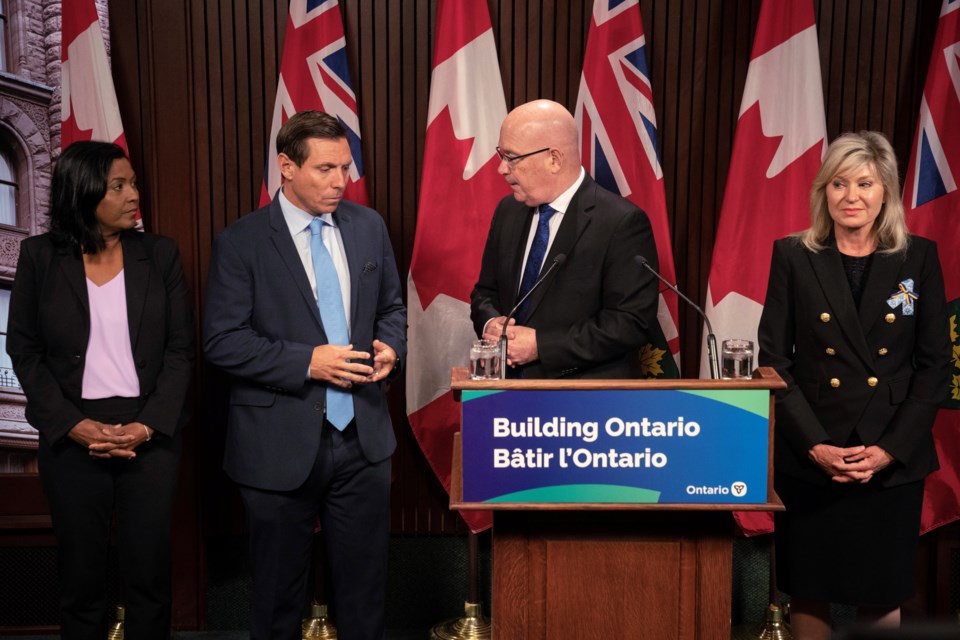Housing and Municipal Affairs Minister Steve Clark is moving forward with a promise to probe six municipalities' finances after cities erupted in anger when the province slashed fees they could charge developers for building certain types of homes in an effort to make construction cheaper.
On Wednesday, Clark announced Ernst and Young LLP was chosen to audit Toronto, Newmarket, Peel Region, Mississauga, Brampton and Caledon.
"The audits will help provide a clear and shared understanding of the impacts of changes to development-related fees and charges included in the More Homes Built Faster Act," the press release said, referencing a bill Clark introduced in November 2022.
Clark's bill cut or eliminated some fees municipalities charge on development. The fee reductions mostly apply to affordable units and non-profit housing, as well as purpose-built rentals. Cities can still levy development charges on most market housing, Clark noted in the Tuesday press release.
The charges are normally levied to help pay for infrastructure — like roads, sewers, and transit — to service the new development.
When the bill was introduced, municipalities weren't exactly happy.
"The cumulative impact of proposed changes to municipal fees and charges is significant and contrary to the widely accepted concept that growth should pay for growth," the Association of Municipalities of Ontario (AMO) wrote.
AMO estimated the bill could cost municipalities as much as $569 million in annual lost revenues over the next 10 years.
After the uproar, Clark promised municipalities wouldn't be made poor, so long as they meet home construction targets assigned by the province.
"There should be no funding shortfall for housing enabling infrastructure as a result of (the More Homes Built Fast Act), provided municipalities achieve and exceed their housing pledge levels and growth targets," Clark wrote to AMO last November.
"We are committing to ensuring municipalities are kept whole for any impact to their ability to fund housing enabling infrastructure because of (the More Homes Built Fast Act)," he added.
Clark also called out cities for hoarding development charge revenues.
"Province-wide, municipalities have reported development charge reserves of nearly $9 billion at the end of 2021," according to Wednesday's release.
Reforming development charges was part of several recommendations in the provincial Housing Affordability Task Force.
The growth-pays-for-growth concept is sound in principle, the report said, but it leads to high home prices and new residents fully subsidizing new infrastructure.
One 2019 study found GTA development charges on low-rise housing are three times higher than those levied in comparable U.S. cities, and nearly twice as high as other Canadian cities. For high-rise developments, they're 50 per cent higher than in U.S. cities and 30 per cent higher than in other Canadian cities.
“This next step in the audit process is a critical part of our work to rein in the soaring cost of housing across Ontario, particularly when it comes to affordable, non-profit and family-friendly purpose-built rental housing,” Clark said in a release on Wednesday.
“We want to ensure development-related charges and fees are being used in a manner that supports increased housing supply and critical housing-related infrastructure, but which does not unduly raise the cost of finding a home for hardworking Ontarians.”
In April, Clark and the City of Toronto settled on the audit's terms of reference.
In addition to probing the fallout of Bill 23, the audit will look at how to optimize "growth-related infrastructure investments."
"Have growth-related capital planning decisions been managed with due regard for economy, efficiency, and effectiveness?" the document asked.
More specifically, the study will look at if the city used the various municipal housing construction-related levies "according to their intended purpose" and "consistent ... with the appropriate legislation and having regard for council direction."
"It'll also look at whether the city had appropriate processes in place to ensure the funds collected from those levies were used for proper growth-related projects, and if the actual investments were made according to best practices," the document said.


.png;w=120;h=80;mode=crop)

